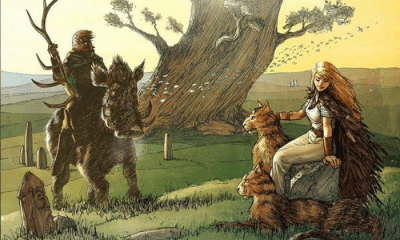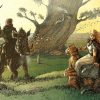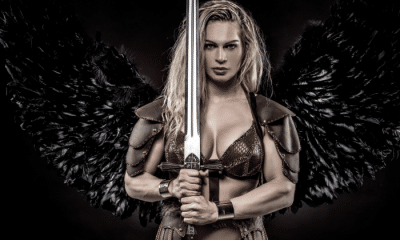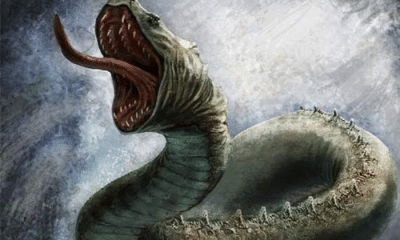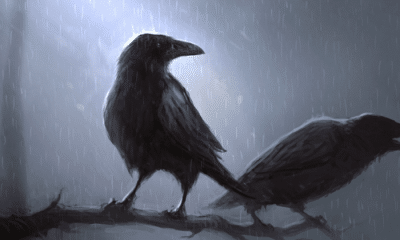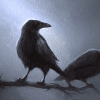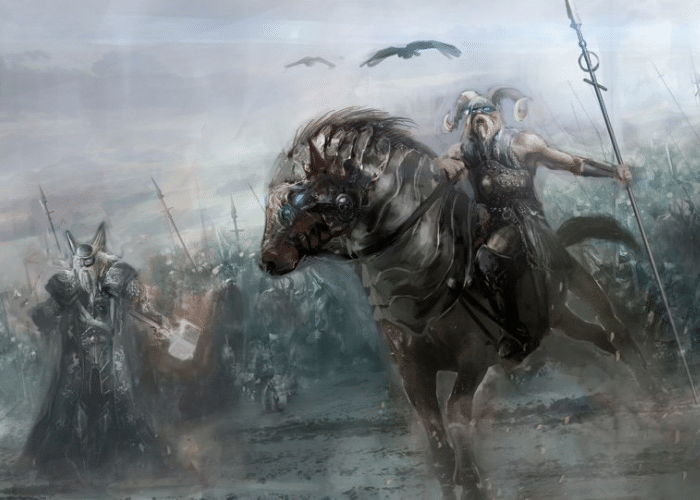
Norse
Vali: The Youngest Norse God
Vali: The Youngest Norse God
Some of Odin’s sons are famous gods, but others are less well known. Keep reading to learn about Vali, the god who was born for just one purpose.
Few stories in Norse mythology provide details about the births and childhoods of the gods. Most often, they appear only as fully-grown adults.
One god, however, exists outside of this typical representation. The reasons for Vali’s birth are made clear and his actions, while those of an adult, occur when he is just one day old.
At just one day old, Vali grows into full adulthood and is strong enough to kill no tone, but two other gods. Odin’s youngest son as a single purpose, and he accomplishes it in his first twenty-four hours of life.
Vali’s story is somewhat more complicated than it may seem, however. A passage in one of the most often-cited mythological texts claims that Odin is not actually Vali’s father and that his role is much different than other passages claim.
The Birth and Vengeance of Vali
According to Norse mythology, the god Vali has not yet been born.
Much of Norse mythology revolves around the prophecy of Ragnarok, the end of both the world and the pantheon of gods. While the gods themselves are aware of this prophecy, they are powerless to stop it.
One attempt to subvert fate is Frigg’s efforts to prevent her son Baldr from being killed. In existing accounts it is unclear whether this event has already come to pass or if it is going to happen in the future.
Baldr is one of the most beloved gods who is so pure and glorious that light shines from within him. His death, however, is one of the events that will spark Ragnarok.
To prevent this, Frigg goes to every thing in all the Nine Realms and asks them to swear that they will not harm her son. Every weapon, stone, and animal swears this oath.
Only one plant refuses to swear. A sprig of mistletoe does not make the promise to Frigg.
The goddess, however, is not worried about such a small and harmless plant. She is confident that her son’s safety is assured.
The other gods are also confident in this. They soon make a game of throwing weapons and other objects at Baldr and watching them change trajectory to make them miss.
During this game, however, one god does not take part. Baldr’s brother Hod is blind, so he cannot participate.
Loki offers to help Hod join in the game by aiming an arrow for him. Hod agrees and Loki lines up the shot for Hod.
Loki, however, has a particularly cruel trick in mind. He knows that the mistletoe did not promise to keep Baldr safe, likely because the plant was Loki himself in disguise.
So Loki made his own arrow from mistletoe. He tricks Hod into shooting the arrow, which instantly pierces and kills Baldr.
Baldr’s funeral is a tragic affair. He is set adrift on his burning ship and his wife, Nanna, throws herself onto the pyre with him.
Odin lends his eight-legged horse, Sleipnir, to Hermod. The horse races to Hel’s realm to convince her to release Baldr.
Hel, one of Loki’s children, agrees that Baldr may return to the living. Her condition, however, is that every living thing in the Nine Worlds must cry in mourning for him to prove that he is as well-loved as Hermod claims.
The gods spread the word and every person, dwarf, elf, and animal alive cries for the loss of Baldr. Only one giantess named Thokk, again presumed to be Loki in disguise, refuses to shed a single tear.
Because of Thokk’s resistance, Baldr is not allowed to leave the land of the dead.
Although Hod had been tricked into shooting the fatal arrow, Odin still holds him responsible for the death of his most well-loved son. The All-Father swears vengeance on his blind son.
One of Odin’s mistresses is named Rindr. Sources differ on whether she is a human princess or a giantess.
Rindr gives birth to a son, Vali, who Odin brings into the world with a single purpose. Vali is born to avenge the death of Baldr.
Vali grows into adulthood overnight. The day after he is born, he seeks out and kills Hod.
Hod is killed at the same time as the other gods are occupied in capturing Loki. With his brother dead, Vali will join the rest of the Aesir in the cave in which Loki is to be bound.
Vali kills Loki’s son Narfi by transforming into a wolf and tearing him into pieces. Narfi’s entrails are turned to iron used to bind his father to three rocks in the cave, where he will remain until Ragnarok.
In a single day, Odin’s youngest son exacts vengeance on both of those responsible for his brother’s death. Hod is sent to Hel and Loki is bound and tortured.
Vali is not mentioned again until the final battle is over. Along with his brother Vidarr, he is named as one of the gods who survives Ragnarok and returns to Asgard to rebuilt and establish a new pantheon.
My Modern Interpretation
While Vali’s story is relatively straightforward because he is not a long-established god, there is still some confusion as to how he fits into the tale.
While both the Prose Edda and the Poetic Edda name him as a surviving son of Odin, with his story being given in more detail in the Poetic Edda, one passage has led many people to believe that he is Loki’s son.
When Loki is taken to the cave, a passage in the Poetic Edda reads, “Then were taken Loki’s sons, Vali and Nari (or Narfi); The Aesir changed Vali into the form of a wolf, and he tore asunder Narfi his brother.”
This passage seems to clearly state that Loki, rather than Odin, is Vali’s father.
Many scholars believe that the confusion over this passage is a result of mistranslation and confusion. The fact that Vali is mentioned as Odin’s son elsewhere in the same text makes this seem even more likely.
Because the text was incorrectly copied or translated in an early version, they believe subsequent translations have relied on incorrect information.
Some translations have included notes that, with the assumption that Vali is a son of Loki, his transformation into a wolf is a form of punishment for Loki’s actions. Other Norse sources, however, refute this interpretation.
The berzerkers, those zealous warriors who were given exceptional strength and resilience by Odin, are often compared to predatory animals. Bears and wolves have the strength and ferocity that define the fighters in service to the gods.
Vali’s transformation can therefore be seen not as a permanent punishment, but as a temporary boon. By changing into a ferocious animal, Vali was able to kill Narfi and bind Loki, his brother’s true killer.
More practically, some historians have pointed out that if Odin only wanted vengeance against Hod there would be no real reason to have another son born. Hod’s blindness would make him an easy target, so an assassin would not have been necessary just to kill him.
Loki, however, was a more wily foe and the nature of his son was never specified. If Narfi, like his siblings, had monstrous or otherwise superhuman abilities it would make sense for Odin to go to greater lengths to ensure his destruction.
Furthermore, Hod’s punishment is not a permanent one. After Ragnarok both he and Baldr emerge from Hel to reconcile and take their places in the new pantheon.
Evidence seems to indicate that only one of Loki’s children was punished on the day he was bound. The often-cited passage that names Vali as Loki’s son is likely a mistake in transcription and translation.
In Summary
In Norse mythology, Vali is the youngest son of Odin.
Despite the efforts of Frigg and the other gods to prevent it, Baldr’s death is foretold. Loki tricks the blind god Hod into shooting Baldr with the only item that can kill him.
Loki then goes further, orchestrating events so that Baldr cannot be released from the realm of Hel. Because of Loki, the most well-loved god of Asgard is lost forever.
Odin swears vengeance and has another son, Vali, to carry it out. His youngest child goes into adulthood overnight and, at just one day old, kills Hod.
Immediately following Hod’s death, Vali joins the other gods where they have captured Loki. Vali transforms into a wolf and kills Loki’s son so the gods can use his entrails to bind the trickster.
A passage from the Poetic Edda, however, complicates Vali’s identification as Odin’s son, however. While other sources, including passages from that same text, are in agreement, one account says that Vali was another son of Loki.
Modern scholarship tends to interpret this single passage as the result of a transcription or translation error.


